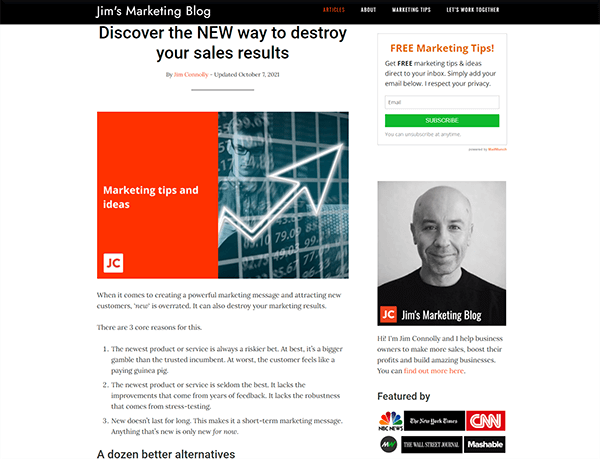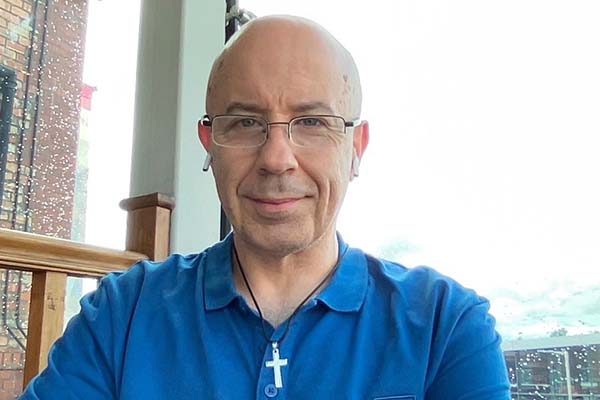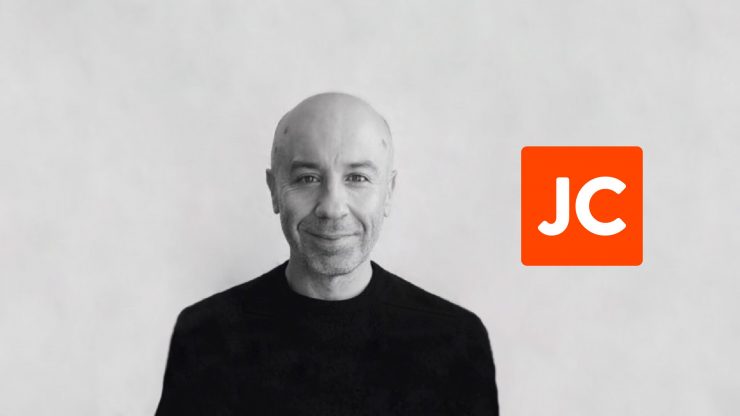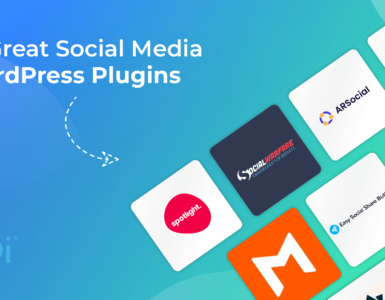Jim Connolly is a marketing mentor and consultant. Having worked with some of the world’s biggest companies, he also offers business advice to smaller concerns, as well as running the popular ‘Jim’s Marketing Blog‘.
We caught up in late 2021 to speak about his work, his passions and his unique take on marketing strategies.
What do you do for a living?
I’m a marketing mentor to small business owners and a marketing advisor to large companies and organisations, worldwide. As a marketing mentor, I work with business owners to show them how to transform the way their business operates, so that everything they do adds to the marketing effectiveness of their business. It’s based around creativity, rather than buying ads or buying attention.
As a marketing consultant to very large companies and organisations, I work on a project basis. Usually either trouble-shooting or providing creativity leadership. I only accept clients by recommendation and have never advertised it as a service.
Who are your clients?
I provide two services; each is aimed at very different clients. My marketing mentor clients are small to medium-sized businesses. They range from self-employed consultants of all stripes, to marketing agencies, designers, trainers, lawyers, writers, software developers, accountants, PR companies and retailers.
My marketing advisor clients are usually very large. These range from banks, technology companies, TV networks and soft drink companies to scores and scores of well-known names in the music industry, including two Grammy award winning artists.
What attracted you to this line of work originally?
At school I wanted to become a professional boxer. Sadly, when I was still just a teenager, I received 3 skull fractures in an incident, which ended my boxing dream. I tried working in sales and to my surprise really enjoyed it. However, I quickly realised the best sales people created their own sales leads, by marketing to prospective clients or customers, in advance.
So, I started to write to prospects, ahead of contacting them by phone. My sales results went through the roof. Soon, the boss asked if I’d do this for the whole sales team. She promoted me to the position of sales and marketing manager, with more than double my previous salary and a commission per sale made by my team.
I was just 21 years old and decided to learn everything I could about marketing. I loved, and still love, the creativity involved in developing new strategies and tactics. That was where my marketing career began. I’ve been very, very fortunate.
I was just 21 years old and decided to learn everything I could about marketing. I loved, and still love, the creativity involved in developing new strategies and tactics.
Jim Connolly
How did you get to where you are today? Did you have a ‘big break’ or was it more of a series of small steps?
It was lots of small steps, using a mix of good timing and intuition.
I had a hunch in the late 1990’s that once the Internet became mainstream, it would be essential to stand out in a meaningful way, or be ignored. Fortunately my hunch worked out and it gave me a huge head-start in my profession.
Initially, I looked for every viable opportunity to zig, when my counterparts zagged. In doing so, I found myself with clients in over 40 countries, including 2 of the 10 largest companies in the world. That zig zag strategy was also the Genesis of a creative marketing strategy, which I’ve successfully shared with clients in almost every industry.
I subscribe to your newsletter, and I’d recommend it. I find them useful regular reminders to do the ‘right things’!
How did you land upon your short-and-sweet, single-message style?
In 1999 I started a newsletter. That’s where I developed my short, single message way of writing. Then 9 years later, when I started the blog, I carried on in a very similar way. I knew people were busy and lacked the time to wade through long blog posts, to find the core message. So I focus on one thing, get to the point and finish. Search engines hate it. But people really like it.

I see you on Twitter quite often. Do you think it’s a good business tool? Is it just a fun distraction/place to vent?
Commercially, Twitter is most useful (to me) these days if you want to listen to your marketplace and learn what matters to them. People rant about poor quality products or bad service on Twitter, but they also share stories of how companies and brands have exceeded expectations. There’s a lot we can learn from this kind of listening.
Twitter also makes it very easy to connect with extremely influential people, who would otherwise be almost impossible to dialogue with. This has been really useful to me and my clients.
Here’s a difficult one: many of 20i’s clients are in marketing, or marketing-adjacent creative industries like web design. What’s your number-one piece of business advice for someone starting out in the field?
My number one piece of advice, is to determine what you want from your business, then develop your ‘own way’ to deliver it. Everything you do as a provider, which is similar to your competitors, simply camouflages you.
Everything you do as provider which is similar to your competitors simply camouflages you.
Jim Connolly
So build your very own menu of services. Set your own fees (not based on what your competitors charge, because your service will be different to theirs), choose your own ideal client profile and never work for anyone who won’t give you the freedom to do your very best work.
Build your own version of what a marketing / design / whatever business should be. Make it ‘yours’. I get about .001% of marketing enquiries. But I get 100% of the enquiries for Jim Connolly’s way of doing things.
It’s a zero competition business model. You can go zero competition too. Everyone can, even in heavily legislated industries and professions. The biggest single industry for my services has always been those in marketing and marketing related services. I love that, because I love the industry. And none of them are my competitors.
How was lockdown for you? Any different?
I switched to remote working in 2002 and my clients since then have worked with me via digital communications; initially using tele-conferencing, then as broadband speeds increased, video conferencing on Skype and then Zoom.
So, lockdown itself made no difference to how I work. However, because I work with clients worldwide, different clients were going into, and out of, lockdowns all the time. That was certainly a unique challenge.

Hope you don’t mind me saying this: but you’ve been in the marketing game for a long time (!). What do you think has changed the most over the last 20-odd years, if anything?
That’s right, I’m 56 and landed my first marketing job aged 21! The biggest change for me has been the arrival and ubiquitous use of the Internet and worldwide, digital communications.
It changed so much about the marketing industry and opened up opportunities that past generations couldn’t have dreamed of. It impacted almost everything. That said, the basics of marketing remain the same, though.
You’re a London lad at heart: what brought you up to our neck of the woods (Notts)?
Yes, I was born and raised in London. I also met Sharon, my future wife, there. However, Sharon, grew up just 40 minutes north of where we now live. When we decided to start a family, we realised that we could work from anywhere and live anywhere, so we chose to move north.
My family are all over the country and abroad, so I had no family ties to London. It was a great move, but I sometimes miss the energy of a busy city. I go back and visit London when I can.
I think I already know your answer to this, so this is just me being a bit contrary: Apple products: over-priced status symbols or world-beating tech? Discuss.
I bought my first Apple computer in 2012, after being convinced by a client in the design industry that it would be more reliable than my PC-based machines. It was. So as each of my PC devices was due for an upgrade, I replaced it with the Apple equivalent.
Everything connects to everything else in a flawless way. That’s ideal for my workflow. My wife is an author and very happy PC user; having written 5 books on Windows laptops. Our son also prefers Windows machines.
Oh – that surprised me: I thought you were a real Cupertino-convert and wouldn’t let PCs in your house (sorry!).
What do you do for fun when you’re not working?
Outside of work, I spend as much time as possible with my wife and son. I also volunteer regularly (serve food, chat with people, clean tables and wash-up) at a centre for local people, where they can come in for a nutritious meal and companionship. It’s extremely rewarding and a really important part of my life.
I like to keep fit and exercise outdoors 365 days a year, which is easy in the countryside as it’s so open and peaceful. I almost never watch TV, but I do read a lot.













Add comment